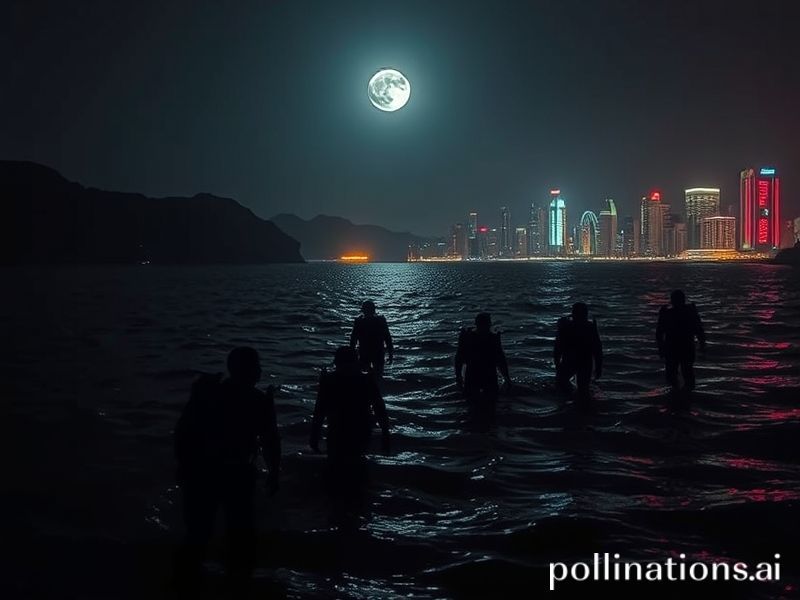Hermit Kingdom Frogmen: How Rumors of North Korean Navy SEALs Expose the Global Fear Economy
Pyongyang’s New Wet Suits: What a Rumored North Korean Navy SEAL Program Says About the World’s Favorite Hermit Kingdom
Dave’s Locker | International Desk | By E. V. Mortensen
SEOUL—Somewhere between the 37th parallel and the Sea of Japan, a man in a knock-off Crye Precision uniform is reportedly trying to grow a beard that won’t quite take. South Korean intelligence, in its weekly exercise of translating paranoia into PowerPoint, has concluded that the Democratic People’s Republic of Korea (DPRK)—motto: “We put the ‘ill’ in ‘isolation’”—is training its own brand of maritime commandos. Cue the international press corps tripping over itself to call them “North Korean Navy SEALs,” because nothing says nuanced coverage like stapling a U.S. trademark onto a regime that still uses fax machines for diplomacy.
Let’s zoom out for a second. The planet is currently juggling a land war in Europe, record-breaking heatwaves, and TikTok’s algorithmic descent into soft-core cosplay. Yet here we are, fixated on whether Kim Jong-un’s minions can do a combat sidestroke without sinking their own propaganda boat. The timing is delicious: Washington just parked another carrier strike group in Busan, Tokyo is rewriting its pacifist constitution like it’s a mixtape, and Moscow—fresh out of reputable allies—has been caught bartering artillery shells for North Korean MREs that taste like cardboard marinated in 1952. Everyone needs a hobby; apparently Pyongyang chose underwater demolition.
Western defense analysts, never ones to miss a budget-justifying panic, warn that these alleged “SEALs” could infiltrate the South’s coastline, sabotage critical infrastructure, or worse—post a TikTok. Seoul’s response has been to stage more amphibious exercises, which mostly consist of very fit conscripts jogging in slow motion while K-drama soundtracks swell in the background. Meanwhile, China’s Foreign Ministry issued a statement urging “all parties to remain calm,” diplomatic speak for “please don’t make us choose cousins at the reunion dinner.”
The broader significance? It’s not really about the frogmen. It’s about the global cottage industry of threat inflation. Every nation, from Norway to New Zealand, now needs its own special-forces origin story to sell at arms fairs. If the North Koreans can cobble together rebreathers from spare bicycle parts and Cold War oxygen tanks, surely your defense minister can justify that third helicopter carrier. Arms manufacturers toast with champagne that tastes suspiciously like lobbying budgets.
There’s also the soft-power angle. Pyongyang has watched the U.S. Navy turn the SEAL brand into a Hollywood franchise—complete with video games, energy drinks, and a line of protein powder that promises to make your biceps look like they’ve been sanctioned by the Treasury Department. The Kim regime wants in on that action. Imagine the merch: “Juche Frogman” cologne, bottled seawater from Wonsan Bay, and a workout program guaranteed to give you the lean physique of someone who’s eaten nothing but rice and ideology since birth.
Europe, distracted by its own existential crises—Brexit hangover, anyone?—has responded with a collective Gallic shrug. Brussels is too busy debating whether to label nuclear power “green” to worry about North Korean scuba lessons. Across the Atlantic, Washington’s cable-news chyron writers are already testing font sizes for “KIM’S KILLER FROGS.” Somewhere in Florida, a former president is wondering if he can trademark the term first.
And the human element? The would-be commandos themselves. Recruits are reportedly pulled from fishing villages where the average teenage male has lungs like hot-air balloons and exactly zero knowledge that SpongeBob is not a documentary. They train at night, allegedly, because daytime is reserved for mandatory Kim Il-sung hagiography and farming rocks. If any of them actually make it to the South, their first glimpse of a convenience store will be more mind-blowing than any firefight.
In the end, the story is less about aquatic super-soldiers and more about the planet’s grim talent for monetizing dread. Whether these North Korean “SEALs” ever materialize is almost beside the point; the mere rumor has already succeeded in nudging defense budgets, spooking markets, and giving pundits something to shout about between commercial breaks. As ever, humanity’s most reliable renewable resource is fear—solar panels optional, cynicism included.







